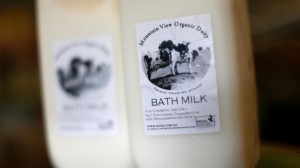In late 2014, three children in the Australian state of Victoria developed hemolytic uremic syndrome linked to Shiga-toxin toxin producing E. coli in unpasteurized bath milk produced by Mountain View farm. One child died, and two others developed cryptosporidiosis.
 The Victorian government quickly banned the sale of so-called bath milk, which although labeled as not fit for human consumption, was a widely recognized way for Australian consumers to access raw milk.
The Victorian government quickly banned the sale of so-called bath milk, which although labeled as not fit for human consumption, was a widely recognized way for Australian consumers to access raw milk.
What followed was a despicable whisper campaign that the child who died had an underlying medical condition, it wasn’t Shiga-toxin producing E. coli (STEC), farmers were losing access to lucrative markets – anything but the basic and sometimes deadly biology of STECs and everything involving fantasy and fairytales.
Today, a coroner heard unpasteurised milk was the probable cause of death of a three-year-old Victorian child who had no previous medical issues.
The toddler’s father told police he had given his son small amounts of Mountain View Organic Bath Milk on rare occasions in the months leading up to his October 2014 death.
The Coroner’s Court yesterday heard a Department of Health investigation, a forensic pathologist’s report and a subsequent outbreak of illnesses among four other children who drank the raw milk had all established its consumption as being the likely cause of the tragedy.
The child’s death prompted a health warning and led the State Government to introduce tough laws making unpasteurised milk sold in Victoria undrinkable.
After hearing details of the investigations Coroner Audrey Jamieson yesterday said she was satisfied issues that would have warranted a full hearing into the death had already been dealt with and she could make a determination on the balance of probabilities.
But after lawyer Rose Raniolo representing Mountain View Farm said she wanted to review a hospital form in which the boy’s parents listed everything he had consumed, Coroner Jamieson granted her seven days to put forward any additional information before making a final decision on whether a public hearing was required.
 Coroner’s solicitor Rebecca Cohen told the court the three-year-old had been a healthy child until suffering gasto symptoms on September 30, 2014, and being admitted to Frankston Hospital four days later.
Coroner’s solicitor Rebecca Cohen told the court the three-year-old had been a healthy child until suffering gasto symptoms on September 30, 2014, and being admitted to Frankston Hospital four days later.
He was transferred to Monash Medical Centre on October 6, where it was found his entire large bowel was infected. The boy passed away shortly after.
Ms Cohen told the court a Victorian Institute of Forensic Medicine autopsy was consistent with tests taken during the toddler’s medical treatment, finding the same genetic traces in his bowel that lead to hemolytic uraemic syndrome (HUS), a rare and dangerous infection stemming from E. coli bacteria which can be present in raw milk.
In the weeks following the death the Department ordered tests on samples from 39 bottles of Mountain View Dairy milk and found that shiga toxin which produces E. coli bacteria was cultured in one sample.
The department’s investigation stated that although HUS infections were usually an “exceptionally rare occurrence” it was dealing with two non-fatal cases at the same time as the death — and the only link was that all three children had consumed the same unpasteurised milk.
Two cases of cryptosporidium also reported among young raw milk drinkers in the same area within a 10 days of two HUS cases reinforced the pathology evidence, Ms Cohen said.
Ms Cohen emphasised that at no time was there any suggestion Mountain View Farm breached regulations, and no prosecution had even been considered against the producer.
She said that during a police investigation the toddler’s father told officers he purchased Mountain View Organic Bath Milk in the months before his son became ill.
“(The father) understood the milk was labelled not to be drunk, but he noted it looked like every other milk container,” Ms Cohen said.
“Due to his intolerance to dairy, (the child) would only drink very small amounts of the unpasteurised milk, and only on odd occasions. “(The father) said it only amounted one-eigth of a sippy cup, and only twice per month at a maximum.”
Ms Raniolo said she disagreed with a recommendation for the coroner to rule unpasteurised milk as the probable cause of the death, stating the child drank it too rarely for it to be considered as the cause.
After a separate review cleared the hospitals’ of any concerns over the treatment of the child, the toddler’s emotional father told the coroner he now wanted the probes to be finished.
“To me it was a big deal watching everything that unfolded, and I do still struggle with the idea that it was treated as seriously as possible. But, I understand it was not likely to have changed the outcome. I don’t want to get involved in this any further, I don’t want to drag this out.”


